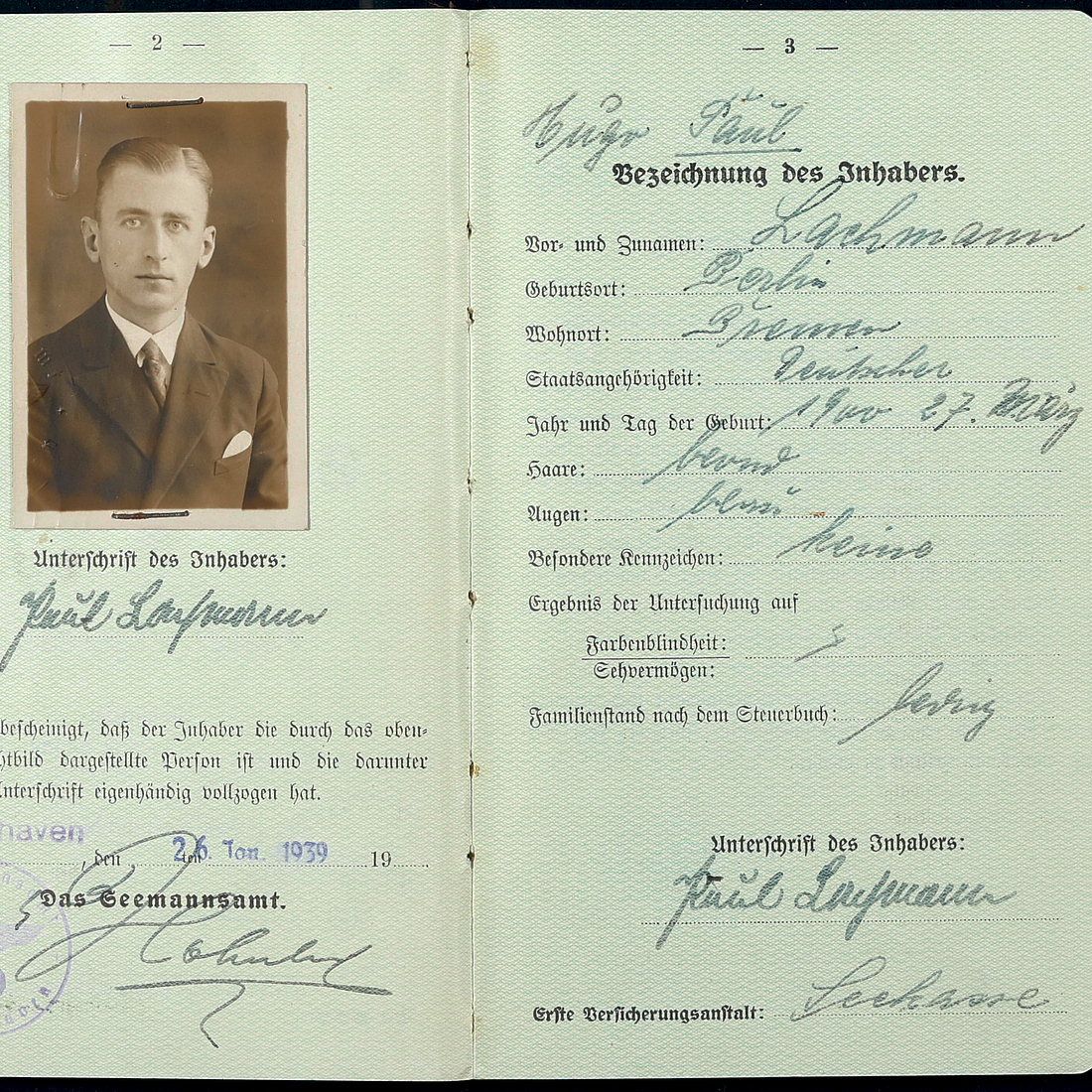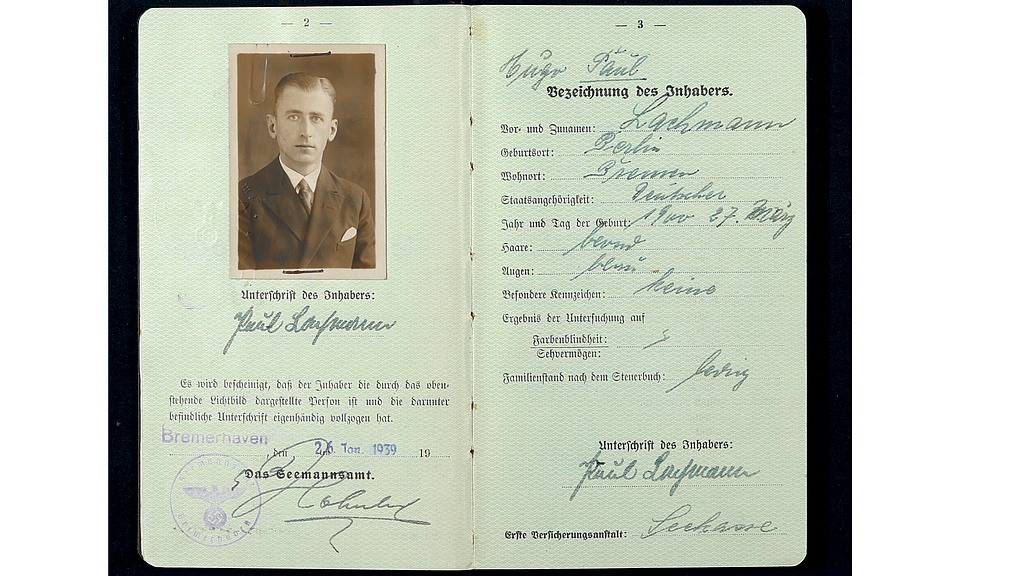Archive of the month: The bookseller Paul Lachmann
In the "Archival item of the month" series, the German Maritime Museum (DSM) / Leibniz Institute of Maritime History presents a special treasure from the archive every month. For March, provenance researcher Dr Kathrin Kleibl investigated two seafaring books belonging to the ship's bookseller Paul Lachmann, who worked for the "Buch- und Kunsthandlung Franz Leuwer" on the BREMEN and EUROPA.
At the beginning of the 20th century, North German Lloyd (NDL) endeavoured to modernise its passenger ships. One of these innovations was the establishment of on-board libraries and bookshops. In 1905, Franz Leuwer, who ran a flourishing book and art shop in Bremen, signed an exclusive contract to supply numerous NDL passenger ships with books - such as the SIERRA MORENA, SIERRA CORDOBA, COLUMBUS, BREMEN and EUROPA. Each of these ships housed self-contained libraries. In addition, Leuwer also operated bookshops on these ships, which were run by booksellers from his company.
Two seafaring books from one of the ship's booksellers - Paul Lachmann - have been preserved in the archives of the German Maritime Museum (Sign. III A 01317-11). Every person who belonged to a ship's crew had to have a seaman's book, in which every signing on and signing off was entered. Seafaring logbooks were the equivalent of an identity document and served, among other things, to identify the owner of the ship.
Hugo Paul Lachmann was born in Berlin on 27 March 1900. According to the two seafaring books, he was a bookseller from 1929 to 1938 under the well-known Captain Leopold Ziegenbein, then in 1938 under Captain C. W. Hagemann, and in 1939 under Captain Adolf Ahrens on the BREMEN (between Bremerhaven and New York and around South America) and in 1939 under Captain Oskar Scharf on the EUROPA (between Bremerhaven and New York). His last decommissioning took place on 4 September 1939.
Lachmann's employer - the "Franz Leuwer book and art shop" - was run by Leuwer's widow Johanna (Anni) Leuwer after his death in 1916. Only a short time after the National Socialist takeover in 1933 and the announcement of the "Nuremberg Race Laws", Anni Leuwer was persecuted as a "Jew". At the insistence of the Nazi regime, she was finally forced to transfer the book and art shop to her employee and authorised signatory Carl Emil Spiegel in 1937; this was referred to as the "Aryanisation" of a company. The former boss was not only ousted from business life, but also disenfranchised and discriminated against in her private life. Along with many other persecuted people from Bremen and the surrounding area, she was deported to Theresienstadt, where she died of malnutrition on 8 February 1943 due to inhumane living conditions.
After the outbreak of the Second World War in September 1939, the Wehrmacht drafted Lachmann, who worked for the "book and art dealer Franz Leuwer", and the entries in his seafaring book ended. At this time, Spiegel supported his employees who had been called up for military service with a voluntary financial "subsidy" to maintain their rented flats in Bremen. Initially, Lachmann also benefited from this. Although this "aid" was based on "National Socialist ideas", Spiegel himself had probably never been a member of the NSDAP.
However, when Lachmann wrote a letter to a colleague at "Franz Leuwer" at the end of May 1940 criticising the development of the war and the political leadership, Spiegel cancelled his "aid" without comment the following month. In August 1940, Spiegel summarily dismissed Lachmann on the grounds that his "political attitude and its effects, which were unacceptable for the German book trade" meant that he had to be dismissed. Spiegel signed the document with "Heil Hitler!".
Unfortunately, we do not yet have any further information about Lachmann's fate. However, the "Franz Leuwer Book and Art Shop" in Bremen has repeatedly been the subject of provenance research at the German Maritime Museum in recent years. Kleibl gave a lecture on this and on Spiegel's purchases at so-called "Jewish auctions" in Bremen in 2021 on the occasion of the international symposium "The Handling of Removal Goods of Jewish Emigrants in European Ports" at the Haus der Wissenschaft in Bremen, which can be accessed via the YouTube channel of the German Maritime Museum: https://www.youtube.com/watch?v=W8IwwijHpqA.
Overview of archives of the month
Archival item of the month: Treasure from the archive
Archive of the month in January: From New York to Bremen in 1859
Archival item of the month in February: Photos of the small cruiser MEDUSA
Archival item of the month in March: James Cook in the Southern Ocean or The "Carte de l'Hémisphère Austral"
Archival item of the month in April: The engine journal of the Bremen icebreaker DONAR
Archival item of the month in May: The diary of Caroline von Aschen
Archival item of the month June: Maritime journal of the stoker Käthe Franck
Archival item of the month July: Etching by Max Liebermann
Archival item of the month August: General plan of RAU IX
Archival item of the month September: The tethered balloon ascent of the first German Antarctic expedition
Archival item of the month October: Menu on board the passenger steamer BREMEN IV
Archival item of the month November: Board diary of the ISABELL
Archival item of the month December: Hand drawings by Themistokles von Eckenbrecher


